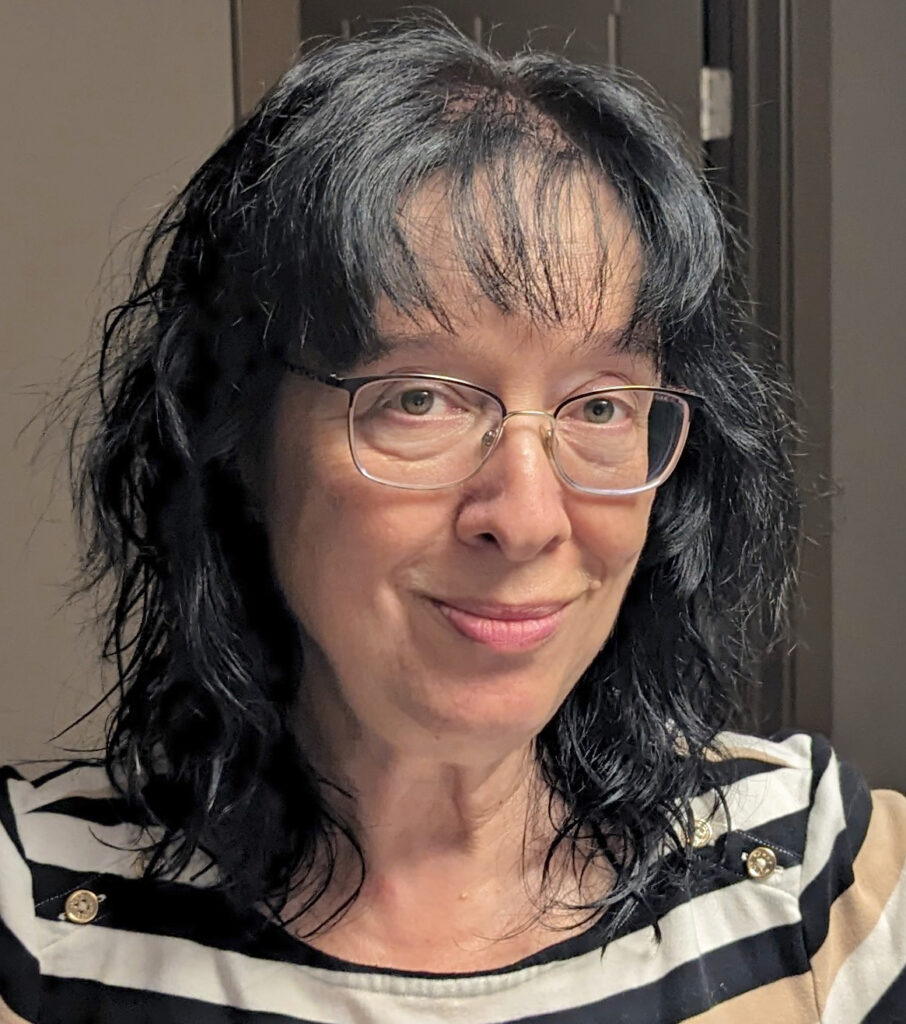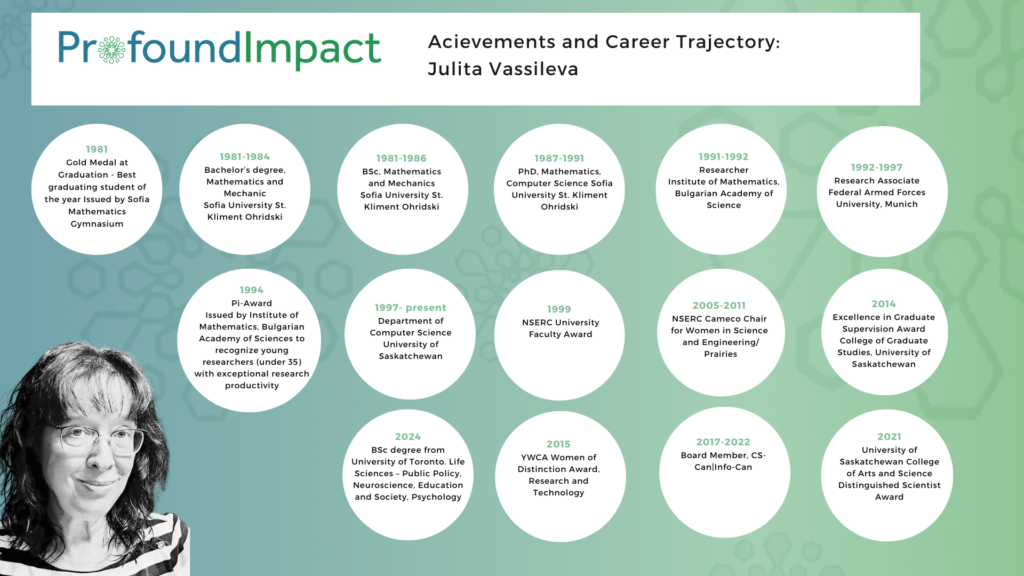

University of Saskatchewan
Julita Vassileva has been acclaimed both for the excellence of her research in Artificial Intelligence and Education, User Modelling and User-Adaptive Systems, Multi-Agent Systems, Trust and Reputation Mechanisms, Incentive Mechanisms, Online Communities and Social Computing, and her passion for promoting the status of women in computer science and in all areas of science and engineering where women are underrepresented.
Born and educated in Sofia, Bulgaria, Julita wanted to be a poet and writer as a teenager. But Bulgaria was a socialist country, freedom of speech was severely constrained, and only those whose creativity flew in the permitted channels could make a living as poets or writers. How did she choose a career in science? “I come from a family of scientists,” she says. “My grandfather was a professor in biochemistry. My mother was an associate professor of chemistry and my father – of physics.”
She continues, “I hated math in primary school and wasn’t very good at it until we started learning geometry in grade 5. Suddenly I was captured by the simplicity of images and elegance of geometry as compared to the formal rules to be followed in algebra.”
Julita competed to be accepted to the Sofia Mathematics Gymnasium high school and she credits one great teacher, who taught her class for only three months in grade 9, for her enthusiasm for math. “The teacher creates the vocation,” says Julita. “He taught math in a completely different way. He didn’t follow the textbook but taught us as though we were university students, starting with complex numbers instead of teaching how to solve quadratic equations by ‘Just remember this formula’.” We saw the problem stretched on the plane with an imaginary axis and a real one instead of squeezed on a linear axis and suddenly the solution – the Viet formula – made perfect sense. I saw the link between algebra and geometry. The whole class was hooked. He was also an opera singer. When a student solved a problem well at the blackboard, he would sing an aria!”
Julita studied mathematics and mechanics at Sofia University St. Kliment Ohridski and, after completing her Ph.D. in mathematics and computer science, she accepted a position as a Research Associate at the Federal Armed Forces University in Munich. “This was after the fall of the Iron Curtain and it was now possible to travel from Bulgaria to the West,” says Julita.
Although she enjoyed her time in Germany and wanted to pursue a career in research and academia, the position was limited to a five-year term. Julita’s home country was in deep economic turmoil, so returning to Bulgaria was not an option. She decided to make the move to Canada after receiving an offer from the University of Saskatchewan, where she would work in one of the five leading groups in the world conducting research in Applied AI, AI in Education and building good systems for teaching.
Julita’s ground-breaking research is focused on applying AI to solve education and social problems and includes intelligent tutoring that incorporates personalization and user modeling, multi-agent systems that build trust to ensure technology is seen as beneficial, designing incentive mechanisms that encourage participation in online communities and persuasive technology that facilitates behaviour changes to benefit users and their communities.
“Since people are motivated by different things, I am particularly interested in personalization approaches that tailor incentives for users depending on their personal features and the features of their groups and communities,” she says about her focus on building successful online communities and social computing applications.
Julita is passionate about science outreach and promoting the advancement of women and minorities in Computer Science. As the NSERC Cameco Chair for Women in Science and Engineering (WISE)/Prairies from 2005-2011, she developed the Science Ambassadors outreach program, which enriches classroom science learning in remote Indigenous communities. “Indigenous people are extremely underrepresented in Science and Engineering. What if we could encourage more women from Indigenous communities to enter these fields through a program that brings science students to the north to help the teachers teach science in interesting ways and to serve as role models?”
Julita credits colleagues Chary Rangacharyulu from the Department of Physics and Lee Wilson from the Department of Chemistry for the idea of Science Ambassadors. As Chair, she had the budget to make it happen by paying a summer job honorarium for University students to work with teachers and students in remote communities for one month. The program, which reaches over 2,000 children annually in Alberta, Saskatchewan and Manitoba, covers the cost of flying university students to northern communities that have trouble attracting teachers. These students consult in advance with teachers to understand how they can help, and then develop and help deliver material based on those discussions.
The Science Ambassadors program has been active for 16 years and continues to be operated by the College of Arts and Science after Julita’s term as NSERC WISE Chair ended. “I am very proud of the program and the impact it has had on bringing a larger cohort of Indigenous students to the University of Saskatchewan,” she says.
In addition to the prestigious NSERC WISE Chair, Julita’s research and outreach work has been recognized with the University of Saskatchewan College of Arts and Science Distinguished Scientist Award in 2021 and with a Saskatoon YWCA’s Women of Distinction Award for Science and Technology in 2015. She has received appreciation letters from the Hon. Senator Lillian Dyck, and from the professional societies ACM and IEEE for her work on promoting women in science and engineering. She is proud of the many “Best Paper” and especially the “Best Student Paper” award certificates for her students that decorate a wall in her office.
Julita is enthusiastic about Saskatchewan and her work. “I felt as though I could finally breathe freely when I moved to Saskatchewan. I love the climate, the blue skies and the clean, white snow. And I love my research and working with my students. My happiest moments are when we hit “Submit” just before midnight after collaborating on a paper in the cloud for many hours with my students to meet a publication deadline!”
You can see more about Julita’s career and impact in the visualization below.
